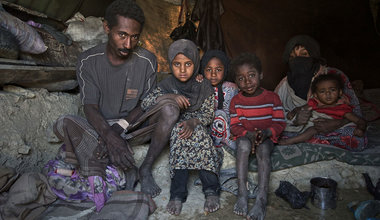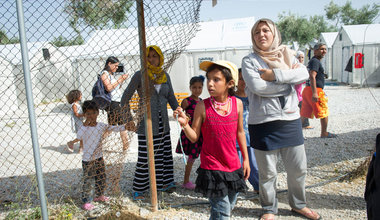Ban hails UN-backed fund to fight AIDS, tuberculosis, malaria as partnership model for Global Goals
 Praising the Global Fund to Fight AIDS, Tuberculosis and Malaria as a model of partnership that brings together people and development partners, governments, civil society, the private sector and people affected by diseases, United Nations Secretary-General Ban Ki-moon today said such broad cooperation is also the key to achieving the UN Sustainable Development Goals.
Praising the Global Fund to Fight AIDS, Tuberculosis and Malaria as a model of partnership that brings together people and development partners, governments, civil society, the private sector and people affected by diseases, United Nations Secretary-General Ban Ki-moon today said such broad cooperation is also the key to achieving the UN Sustainable Development Goals.
“Working together and transcending sectoral boundaries is the only way to tackle the interconnected challenges that determine human well-being,” Mr. Ban said in Montreal, Canada, where world leaders have gathered for the fifth conference convened to replenish the Fund, which was founded in 2002 and raises and invests some $4 billion annually to support programmes run by local experts in countries and communities most in need working to accelerate the end of AIDS, tuberculosis and malaria as epidemics.
Hailing the Fund's past 15 years of achievement and looking forward to even more success in the critical years to come, the UN chief said that since it was established, the mechanism has helped to save some 20 million people.
“Its example of working for countries, communities and groups most in need provides a firm foundation for the new era of opportunity that began this year,” he said, noting that the 2030 Agenda for Sustainable Development is a roadmap for people, planet, peace and prosperity through global partnership.
“We are now here to bring this global partnership to make this planet Earth and people more prosperous and live in a peaceful world. It is built on the principle of partnership, and its object is to leave no one behind, wherever you are coming from, no matter what ethnicity or belief you may have,” continued Mr. Ban adding that this is what Global Fund is about, and “I am very proud of role that UN organizations have played and will continue to play, together with you.”
Working together and transcending sectoral boundaries is the only way to tackle the interconnected challenges that determine human well-being
Over the next 15 years, international organizations and partners must work together to achieve the Sustainable Development Goals (SDGs) “for everyone, everywhere,” said the Secretary-General, noting that the 17 Goals are holistic, universal and integrated, encompassing, among others, gender equality, human rights, water and sanitation, education, governance, peace and stability.
“Working to end HIV, TB and malaria is intrinsic to the SDGs, and each of the SDGs has a bearing on ensuring healthy lives and promoting well-being for all, at all ages. That is why the Global Fund has sharpened its focus on human rights, key populations and gender equality in its new strategic framework,” he noted, adding that the Fund's current report emphasizes the importance of schooling and equal education, equal opportunity for adolescent girls to prevent HIV.
He went on to stress the need to improve living conditions in crowded urban slums to fight tuberculosis, to address water management and sanitation to eliminate malaria and to help build strong and resilient health systems that are accessible to all people.
“Universal health coverage is one of the SDG 3 targets. This will need significant investment, and the Global Fund has an important role,” said the Secretary-General, explain that more than 40 per cent of Fund's investments are for resilient and sustainable health systems, and that is set to increase, which is essential for sustaining gains already made, and for building on them.
Noting that the Fund has also been a strong driver of increased domestic health investment in many countries, he said the mechanism is a model of successful and broad partnership that brings together people, organizations, the private sector and local level actors in communities in need. Such partnership would be critical for achieving the new UN sustainability goals and tackling interconnected challenges.
“One emerging challenge is antimicrobial resistance. This threatens our response to all [AIDS, tuberculosis and malaria],' warned Mr. Ban, telling the conference that this is such a threat to global health that world leaders are meeting to discuss the issue on 21 September in New York during the high-level segment of the 71st session of the UN General Assembly.
“I urge the Global Fund to join this fight. And I encourage all partners to contribute generously to the Fund,” underscored the UN chief, noting that several partners have made significantly larger pledges in this Replenishment, and that there are commitments from many new partners, including a doubling of private sector contributions, largely because the Global Fund has already proven that it can deliver real results.
“We have the knowledge and tools to end HIV, TB and malaria by 2030. This is our target and ambition, and our vision to make this world better, this planet Earth healthier and environmentally sustainable, where everybody can live without any fear and also with human dignity,” Mr. ban concluded, calling for broad partnership and cooperation “to make this world healthier and better for all.”
Later in the day, Mr. Ban met with Justin Trudeau, Prime Minister of Canada. He thanked the Prime Minister for hosting the 5th Replenishment Conference and noted that it was destined to be a very successful event.
The Secretary-General also commended Canada for its commitment to the implementation of Agenda 2030, as well as on the issue of climate change. He expressed the hope that Canada would ratify the Paris Agreement on climate change before the end of the year, so contributing to the agreement's early entry into force.
According to Mr. Ban's spokesperson, the Secretary-General and the Prime Minister also expressed concern regarding the tensions in the Korean Peninsula. They discussed the acute needs of the UN Relief and Works Agency for Palestine Refugees in the Near East (UNRWA), as well as Canada's valued contributions to United Nations peacekeeping.
 ONU
ONU







